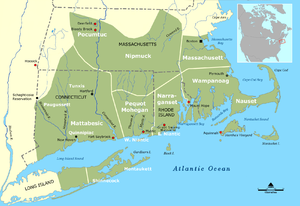Quiripi
| Quiripi | |
|---|---|
| Wampano | |
| Native to | United States |
| Extinct | ca. 1900 |
|
Algic
|
|
| Language codes | |
| ISO 639-3 | |
| Glottolog | wamp1250 |

The location of the Paugussett, Tunxis, Podunk, Quinnipiac, Mattabesic, Unquachog and their neighbors, c. 1600
|
|
Quiripi (pronounced /ˈkwɪrᵻpiː/, also known as Quiripi-Unquachog, Quiripi-Naugatuck, and Wampano) was an Algonquian language formerly spoken by the indigenous people of southwestern Connecticut and central Long Island, including the Quinnipiac, Unquachog, Mattabesic, Podunk, Tunxis, and Paugussett (subgroups Naugatuck, Potatuck, Weantinock). It has been effectively extinct since the end of the 18th century, although Frank T. Siebert, Jr., was able to record a few Unquachog words from an elderly woman in 1932.
Quiripi is considered to have been a member of the Eastern Algonquian branch of the Algonquian language family. It shared a number of linguistic features with the other Algonquian languages of southern New England, such as Massachusett and Mohegan-Pequot, including the shifting of Proto-Eastern Algonquian */aː/ and */eː/ to /ãː/ and /aː/, respectively, and the palatalization of earlier */k/ before certain front vowels. There appear to have been two major dialects of Quiripi: an "insular" dialect spoken on Long Island by the Unquachog and a "mainland" dialect spoken by the other groups in Connecticut, principally the Quinnipiac.
...
Wikipedia
